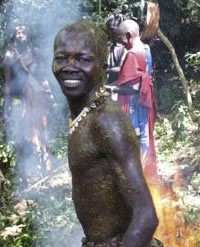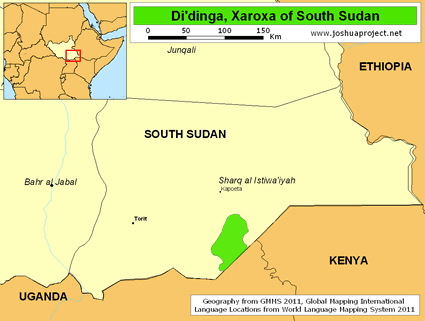In South Sudan, the Didinga live in the Didinga Hills region. Didinga, also known as Xaroxa, also live in the valleys, slopes, plateaus, and nearby plains of the area. Some of the people who live nearby include the Toposas, Turkanas, Boyas, Ketebos, Logirs, Iks, Dodos and Dongotonas. The Didinga, Boya, and Murle share a language called the Murle-Didinga that distinguishes them from all other groups in South Sudan. A group living in southwest Ethiopia also speaks Murle-Didinga.
According to the Didingas, their people moved from Ethiopia two hundred years ago and migrated to the Didinga Hills. While migrating, the Didinga, Murle, and Boya were one group and lived together peacefully in South Sudan. Later, the Murle left the group because of a hunting party dispute, and the Boya left after a famine. Today, though they are separate groups, they share the same language.
The Didingas lived a calm and rural life for many years, raising cattle and owning large herds that young single men supervised. However, starting in 1963 and ending in 1973, a political problem caused many Didingas to leave their cattle and migrate to Uganda. In Uganda, the Didinga people learned about large-scale farming, and their children were introduced to education. After these new experiences, some desired to make money and gain more knowledge, which had been less important in the Hills.
After returning home in 1973, the people hoped to begin incorporating new ideas and concepts from Uganda to their home culture. One problem was that the cattle the Didinga had left behind were significantly lower in number; those who had remained in the Hills Didinga increased the number of cattle since 1963. Today, many Didinga are still working to grow the number of cattle in their herds. People buy more cattle by exchanging grain or beer or using money.
Didingas value farming and education as much as raising cattle. The traditional values that come with raising cattle make up a large part of their culture, but people continue carrying hope for change. Many Didingas enjoy owning large herds and use their cattle for wealth as well as milk that people consume daily and use to make into butter. Though the Didinga people do not fish because eating it is taboo in their culture, they do consume the flesh blood of cattle necks drawn with miniature arrows.
Didingas live in round homes with cone-shaped roofs, which are grouped together by clan in scattered homesteads. However, during grazing periods and other seasons, they might live in rustic camps.
Boys around age eight are placed together every three to five years. Those in the same age grade will play and work together until they marry.
One important aspect of their religious beliefs is that there is a tribal rainmaker whose job is to perform certain rituals to bring rain to the land. Didinga place great importance on worshipping dead ancestors. They also worship and sacrifice to other spirits and gods. However, they have a strong Christian presence, and God can use them to reach other tribes.
The Didingas need more medical facilities and schools in their region to meet their needs.
Ask God to send Didinga laborers to other tribes who don't have the gospel.
Pray that God will give Didinga believers the boldness to share Christ with their own people.
Pray that God will raise up new generations of believers among the Didinga people so that a strong Christian community will develop and spread throughout South Sudan.
Scripture Prayers for the Di'dinga, Xaroxa in South Sudan.
https://en.wikipedia.org/wiki/Didinga_language
https://en.wikipedia.org/wiki/Didinga_people
https://www.101lasttribes.com/tribes/didinga.html
https://humansworld.org/pages/didinga.html
https://www.visualtribes.com/tribes/didinga.htmlPR
| Profile Source: Joshua Project |











